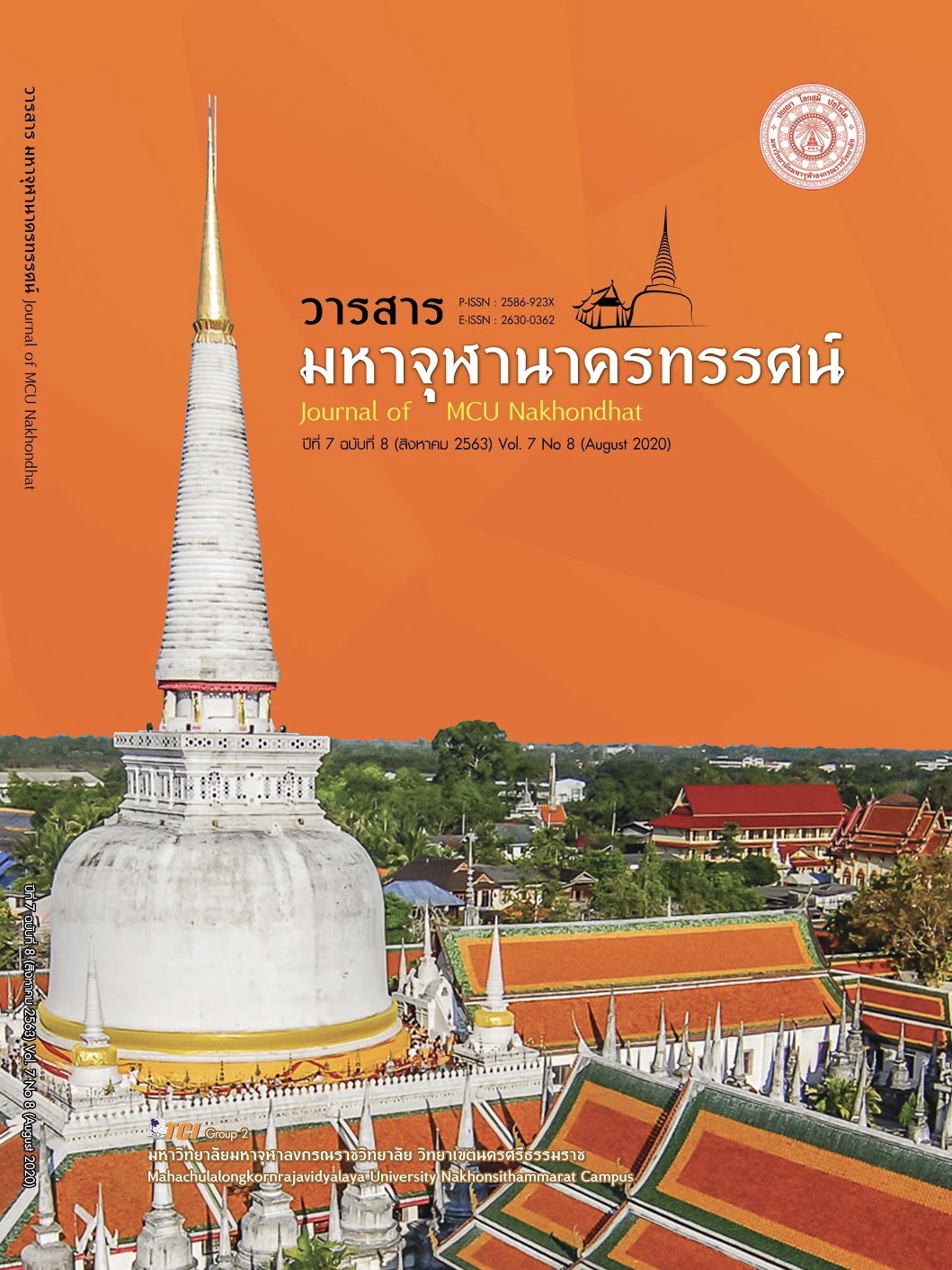THE COGNITIVE TRANSFORMATION THERAPY: INNOVATION OF PRISONERS’ SUSTAINABLE MENTAL DEVELOPMENT
Main Article Content
Abstract
This research article aim to assess before and after participating in the Cognitive Transformation Theory Project. That affects the changes in thinking and behavior of the inmates that is sustainable in preventing the repeat offenses of inmates after the project ends. With integrated research methods data collection by interview questionnaires for small group meetings analyze quantitative data with statistics and qualitative analysis by means of content analysis in conclusion form. The study results show that developing the minds of inmates in prisons through the process of cognitive transformation theory both before and after participating in the program, it is effective statistical significance . Which the cognitive transformation theory process. It is a process that focuses on restoring the basic idea. And the behavior of inmates beginning from the consciousness to the wisdom for the inmates began to know myself and see value in yourself resulting in a new thinking process, reworked in the new knowledge set. When thoughts change their minds and behavior they will change for the better. Ready for the beginning of a new life that affects development changing the behavior of inmates after participating in all 5 aspects of the Cognitive Transformation Theory project consisting of 1 development of 5 precepts 2 physical development 3 social development 4 mental development 5 intellectual development . Resulting in mental immunity That will stop the crime again which is a process of creating sustainability in preventing the recurrence of inmates after the end of the cognitive transformation theory project, the suggestion must continuous monitoring and evaluation of inmates that have been released from prison to prevent reoccurrence.
Article Details
References
ธานี วรภัทร์. (2558). การบังคับโทษและวัตถุประสงค์ของการบังคับโทษจำคุก. วารสาร กำลังใจ, 3(4), 57-62.
นัทธี จิตสว่าง. (2545). หลักทัณฑวิทยา: หลักการวิเคราะห์ระบบงานราชทัณฑ์. (พิมพ์ ครั้งที่ 3). กรุงเทพมหานคร: กรมราชทัณฑ์.
ผู้ให้ข้อมูลสำคัญคนที่ 1. (10 กรกฎาคม 2562). ปัญญาบำบัด: นวัตกรรมการพัฒนาจิตใจผู้ต้องขังอย่างยั่งยืน. (นงนุช โกมลหิรัณย์, ผู้สัมภาษณ์)
ผู้ให้ข้อมูลสำคัญคนที่ 2. (10 กรกฎาคม 2562). ปัญญาบำบัด: นวัตกรรมการพัฒนาจิตใจผู้ต้องขังอย่างยั่งยืน. (นงนุช โกมลหิรัณย์, ผู้สัมภาษณ์)
ผู้ให้ข้อมูลสำคัญคนที่ 3. (10 กรกฎาคม 2562). ปัญญาบำบัด: นวัตกรรมการพัฒนาจิตใจผู้ต้องขังอย่างยั่งยืน. (นงนุช โกมลหิรัณย์, ผู้สัมภาษณ์)
ผู้ให้ข้อมูลสำคัญคนที่ 4. (10 กรกฎาคม 2562). ปัญญาบำบัด: นวัตกรรมการพัฒนาจิตใจผู้ต้องขังอย่างยั่งยืน. (นงนุช โกมลหิรัณย์, ผู้สัมภาษณ์)
ผู้ให้ข้อมูลสำคัญคนที่ 5. (10 กรกฎาคม 2562). ปัญญาบำบัด: นวัตกรรมการพัฒนาจิตใจผู้ต้องขังอย่างยั่งยืน. (นงนุช โกมลหิรัณย์, ผู้สัมภาษณ์)
ผู้ให้ข้อมูลสำคัญคนที่ 6. (10 กรกฎาคม 2562). ปัญญาบำบัด: นวัตกรรมการพัฒนาจิตใจผู้ต้องขังอย่างยั่งยืน. (นงนุช โกมลหิรัณย์, ผู้สัมภาษณ์)
ผู้ให้ข้อมูลสำคัญคนที่ 7. (10 กรกฎาคม 2562). ปัญญาบำบัด: นวัตกรรมการพัฒนาจิตใจผู้ต้องขังอย่างยั่งยืน. (นงนุช โกมลหิรัณย์, ผู้สัมภาษณ์)
ผู้ให้ข้อมูลสำคัญคนที่ 8. (10 กรกฎาคม 2562). ปัญญาบำบัด: นวัตกรรมการพัฒนาจิตใจผู้ต้องขังอย่างยั่งยืน. (นงนุช โกมลหิรัณย์, ผู้สัมภาษณ์)
พระศากยวงศ์วิสุทธิ์ (อนิลมาน ธมฺมสากิโย.). (2561). จิตตมนต์ปัญญาบำบัด. สำนักกิจการในพระราชดำริสมเด็จพระเจ้าลูกเธอ เจ้าฟ้าพัชรกิติยาภา นเรนทิราเทพวดี กรมหลวงราชสาริณีสิริพัชร มหาวัชราชธิดา. กรุงเทพมหานคร: สำนักงานกระทรวงยุติธรรม กระทรวงยุติธรรม.
ศูนย์ศึกษาเรือนจำนานาชาติ (International Centre for Prison Studies - ICPS). (2561). รายงานจำนวนข้อมูลผู้ต้องขัง. เรียกใช้เมื่อ 21 เมษายน 2563 จาก http://www.prisonstudies.org/country/thailand
Bringewat Peter. (2008). Grundbegrifte des Strafrechts Grundlagen-Allgemeine Verbrechenslehre Aufbauschemata. Auflage: Baden-baden.


